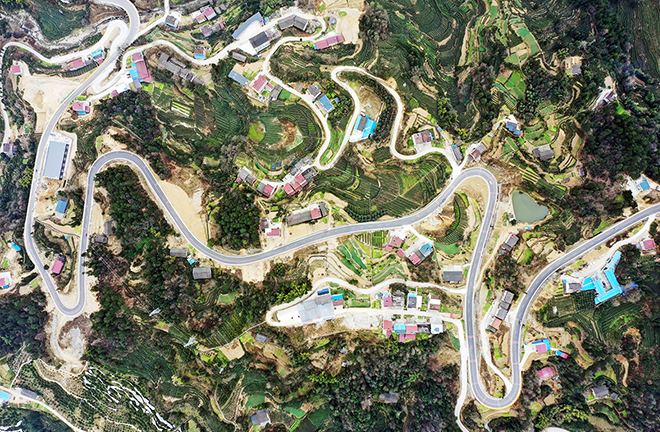China on track of new-type modernization

An aerial photo shows the road network in Maoping Town, Zigui County, Yichang City, Hubei Province, on January 16. In recent years, Zigui has accelerated the construction of rural roads for local people to travel and increase income from citrus sales. Photo: CFP
SHANGHAI—After completing the building of a moderately prosperous society (xiaokang) in all respects, China continues to carry forward a new path of modernization, according to experts at a forum recently hosted by the Shanghai Federation of Social Science Associations.
China's development does not completely repeat the general modernization process of the past, but rather, compresses the process of change which in many countries occurs over one or even several centuries into a few decades, said Li Peilin, a Member of the Chinese Academy of Social Sciences (CASS). Under the background of economic globalization, problems with pre-industrialization, industrialization, and post-industrial development are concentrated in China. Pre-modern, modern, and post-modern phenomena coexist, making social contradictions intricate.
As such, in the post-xiaokang period, China must step out of the trap of Western modernization and actively explore new ways to pursue modernization that promote social integration and social harmony under the new conditions for social diversification, Li said. At present, China's commitment to the path of peaceful development as a major country, shown via a series of its international and domestic policies, will change and revise the logic of Western modernization.
Socialist modernization with Chinese characteristics is essentially a new type of modernization that follows the path of peaceful development. Chen Guangjin, director of the Institute of Sociology at CASS, said that this new model of modernization with Chinese characteristics commits to a people-centered approach, promoting fairness and justice, and aiming to achieve common prosperity for everyone. The general goal of future development is to focus on solving the problems of inequality and insufficiency on the basis of continuing to promote development, and to vigorously improve the quality and efficiency of development.
The overall modernization of the country cannot be achieved without the modernization of agriculture and rural areas, and neither can comprehensive xiaokang be achieved without the xiaokang of rural people, noted Feng Shizheng, dean of the School of Sociology and Population Studies at Renmin University of China. The current social transformation and rural changes in China have multiple common manifestations, including external circulation breaking internal circulation, the disruption and reinvention of rural life, a new metabolism for population and culture, the fracture of rural cooperation, and commercialized social interactions. However, rural life has its own logic.
In the process of transformation from tradition to modernity, rural social foundations have undergone major changes, including the replacement of natural villages with administrative villages, weakening of "mutual-aid systems" of village community life, and the decline of rural value identity. Tian Yipeng, dean of the School of Philosophy and Sociology at Jilin University, suggested that a complete rural social foundation should be reconstructed on the basis of the coordinated development of urban and rural areas.
For a long time there has been an exodus from rural areas, but there are only a handful of people entering the countryside from cities, said Hu Rong, dean of the School of Sociology and Anthropology at Xiamen University. As such, future rural development needs to prioritize cultivating a new type of farmers, scientifically-literate farmers who can master modern agricultural technology and have certain business management capabilities.
Mobility, organization, and governance are three important concepts that connect Chinese society, which are the key to understanding Chinese sociology. He Xuesong, dean of the School of Social and Public Administration at East China University of Science and Technology, said that the land revolution and reform established the basic people-land-village organizational form of Chinese society, and the reform and opening up established the people-occupation-community form.
This transformation process is also a real issue for modern social transformation, He Xuesong continued. The real motivation behind this transformation is land transfer, the disintegration of the work unit system, and the migration of people, dynamics of land, and even villages, caused by the development of modern society and economy. In the Chinese context, governance not only needs to rely on organization, but also needs to respond to the mobility of modern society in terms of governance structure and governance content.
Edited by JIANG HONG
